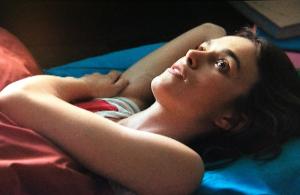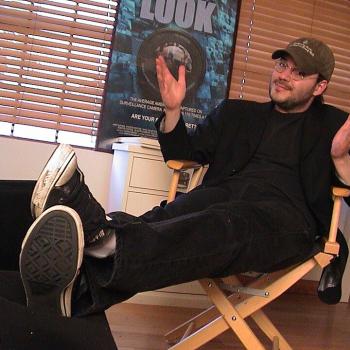
Source: Flickr user Rob Corder
(License)
Right now I’m precepting a course on American Television. The truth is that my favorite TV shows are mostly dark, absurd, or satirical; they play with the conventions of more popular television. Take, for example, Danger 5 (2012-2015), an Australian jab at 60s spy shows, WW2, American masculinity, and (eventually) Operation Paperclip, and 80s fads. Near and dear to my heart is also Check It Out! with Dr. Steve Brule (2010-2016), a Tim and Eric Awesome Show, Great Job! (2007-2010) spin-off about the titular “doctor” (John C. Reilly) who unabashedly reveals his confusions and prejudices on his public-access TV show. Anyone else remember Chris Morris’ short-lived Jam (2000)?
On the first day of class, we went around and mentioned some of our favorite shows and I was struck not by the normality of their taste (we call things “normal” for a reason, right?), but by its antiquity. Friends (1994-2004) dominated the rankings, which struck me as rather peculiar since all these students would’ve been born just as the famed sitcom was going off the air. At the same time, I wasn’t exactly surprised—a slightly younger friend of mine once dated a girl who strapped him in to watch Friends like she was experimenting with the Ludovico Technique. He affirmed that it was like “a warm bath.” It wasn’t transformative, but it was comforting enough.
That got me thinking about my “warm-bath” shows and movies. What came to mind was a film I watched recently, 2014’s Laggies. Directed by Lynn Shelton of mumblecore fame, this early A24 release didn’t impress upon release. Take this exemplary summary from Rogerebert.com’s Odie Henderson:
“Laggies” aims to flip the gender script [from Judd Apatow movies], offering up Keira Knightley as Megan, an immature 29-year old wandering aimlessly through life. But since it can’t rely on blaming a Y chromosome for Megan’s affliction, “Laggies” is forced to either dive fearlessly into immaturity with her or stand on the sidelines to tsk-tsk. It chooses the latter, much to my chagrin.
The movie worked for me precisely because this was not how it came off. I identified with Megan (Kiera Knightley) despite her being a woman; in fact, less a flip of the Apatow script, Laggies aims to be the more mature version of the feel-good, growin’-on-up rom com. The struggles felt real, even if their manifestations bordered on the absurd. The movie does not “tsk-tsk” Megan so much as it sits in the tension between necessary maturity and the God-given right to enjoy some things sometimes. Its resolution leaves much to be desired, but hey, it’s a romantic comedy, a “warm-bath” movie—I wouldn’t have thought of it in this context if it blew me away.
Its relative carefulness is manifest from the get-go. The first scene in the movie has Megan and her friends walking into an otherwise-unpopulated restaurant, giggling about Allison’s (Ellie Kemper) bachelorette party. Everyone is goofing around, fawning over the furniture (like a giant Buddha statue), until Megan’s decision to twist its nipples earns looks of shock and disappointment. When they settle down, the dialogue reflects a controlled middle-class immorality, as they comment on the bride-to-be’s tiny hat and smirk at the glow-in-the-dark penis necklaces around their necks. Soon it’s gametime—each is supposed to write a dirty caption under a cartoon of a man walking in on his wife in bed with the mailman (talk about original!). Two other friends bring the heat through stifled giggles with lines like “He said he had a package for me (sexy growl)” and “I love getting mail (but I spelled it m-a-l-e).” Megan’s raunchier caption naming Allison’s husband is met with utter disgust, leading the betrothed to inquire about her friend’s weirdness with the Buddha. Isn’t that disrespectful? Megan reached into my brain and yanked my thoughts right out: “Did you convert to being a Buddhist?” “That’s disgusting, no,” quoth Allison in reply. “That’s Buddha…That’s BUDDHA.” Megan later implies what I’d hope we’re all thinking: isn’t it more disrespectful to stick Buddha in a badly lit restaurant for a white-girl-autumn bachelorette party?
Shelton’s film might trade in the sorts of soft stereotypes common to Apatow movies (what are her friends but sketches of suburban white women striding into full-on adulthood?), but it’s also more careful than the average romantic comedy. Megan’s boyfriend, Anthony (Mark Webber), whom she’s been with since high school, is a bland fool, the sort of guy who tries to propose to a woman at her best friend’s wedding. He babbles in a precursor to corporate mindfulness jargon and seems to imagine a future painted roughly the color of the average McMansion’s interior walls. Still, Anthony legitimately loves Megan and cares about her happiness. He’s not a caricature and indeed is very much a safe, reasonable choice for a safe, reasonable person (a far cry from the nagging banshee girlfriends of many an Apatow flick). Even Megan’s eventual love interest Craig (Sam Rockwell) demonstrates competing qualities: sensible, mature, a good judge of character, but also the sort of man who declares his love for a deadbeat 29 year old who lives in his daughter’s room and is under arrest for drunk driving.
That’s the plot—Megan catches her beloved, supportive father (Jeff Garlin) cheating, lies to her boyfriend about heading off to a personal development seminar, and accidentally befriends some skateboarding teenagers, one of whom she grows close to, Annika (Chloë Grace Moretz), and moves in with. In no time, she’s caught up in the kids’ lives, pretending to be Annika’s mom for a meeting with her school’s principal (her biological mother divorced her father to become a deadbeat lingerie model).
Megan matures, surely. But she never abandons her sense of humor—she still thinks her friends’ obsessions over unique kids’ names (they have to change from “Jupiter” after someone else uses it) and weird rules about what sorts of raunchiness are verboten and which aren’t confounding. Her growth comes from taking responsibility, as when she covers for Annika’s depressed friend, whose drunk driving is (in Megan’s eyes) ultimately her own fault (she bought the wine). More than that though, she recognizes that this sad kid has his whole life before him. She’s already something of a screw-up, someone who has glided through life doing all the right things, but never really feeling happy or settled. It’s better she takes the fall.
Goofy as it can be, Laggies “gets” the quarter-life crisis as it actually happens. Most people aren’t so straightlaced that they explode with explorative energy as they inch toward 30. Lots of people coast on, go to college, get decent grades, date decent people, keep decent friends, and one day realize that maybe they want more than one accent wall in the suburban architectural nightmare they call a home. It’s not about starting over with blackjack and hookers; it’s about realizing you have to (and should) think for yourself.
I was not exactly that kid. I’m still close with many hometown friends and feel comfortable with my successes and failures. But that doesn’t change that I know I have occasionally lapsed into cruise control, have failed to take responsibility for my own future. And now I lurch toward 30; I’d be lying if I said it weren’t a time of paradoxical growth in both confidence and self-doubt. Growing-up is hard; aging is hard. Laggies offers a funny, but not unrealistic, portrayal of a difficult time in many people’s lives. I’ll take it over Friends in any case.













